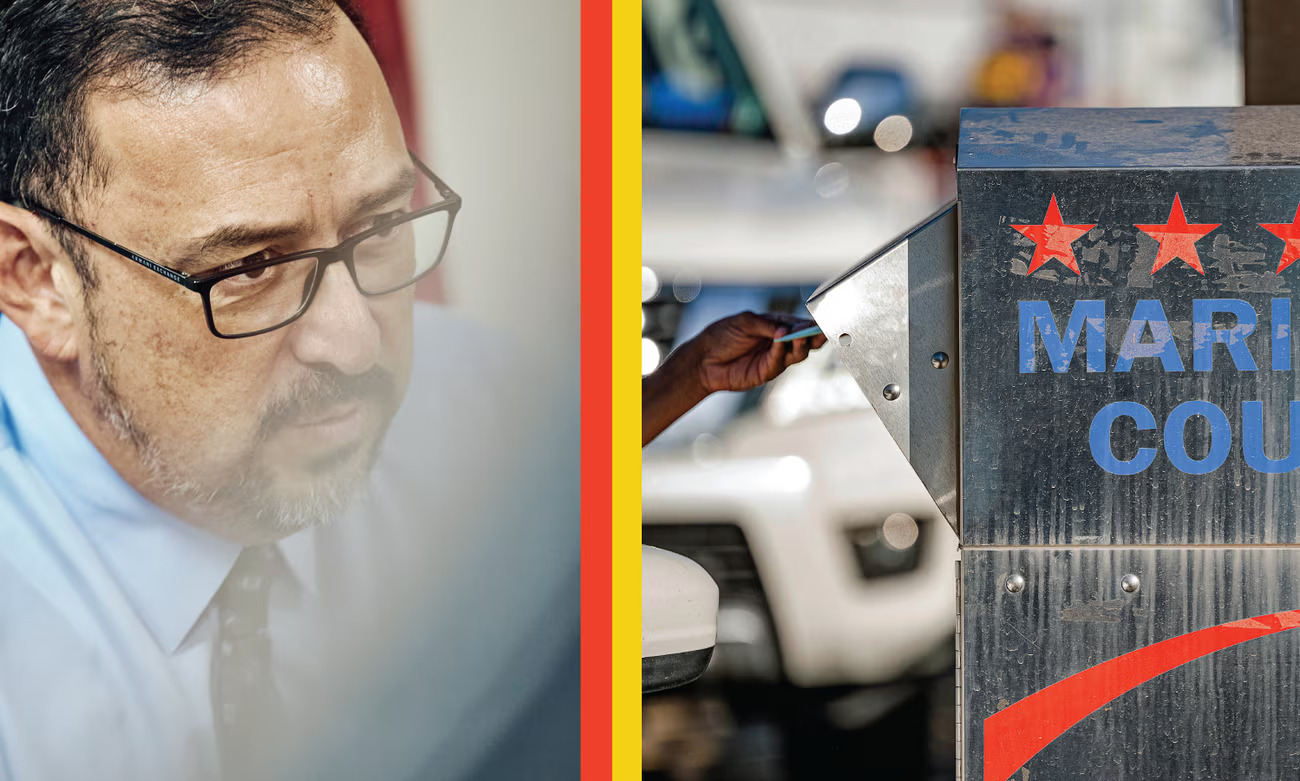On a splendid spring day in Phoenix, beneath the grand cupola of the old state capitol, Arizona’s 112th birthday is celebrated by Secretary of State Adrian Fontes. With solemnity, he recites President William Howard Taft’s proclamation, welcoming Arizona as the 48th state of the union. Speeches praise the state’s stunning landscapes, and a cake adorned with the state seal is divided into 112 pieces and enjoyed in the sunlit Rose Garden.
Yet, amidst the joy, a discordant note strikes. Who is the person standing silently behind Fontes? Why does Arizona’s chief election administrator need a bodyguard?
“It’s very sad,” Fontes remarks. “It’s a sad state of affairs that in a civil society, in one of the most advanced civilizations that anybody could have imagined, we have to worry about physical violence.”
Indeed, Arizona finds itself in troubled times. Until recently, election officials worked largely unseen, ensuring the smooth functioning of democracy.

Democracy at Risk: Trump’s False Claims Hit Hard in Arizona (Credits: The Guardian)
“Nobody knew who we were, what we did,” Fontes reflects. “It’s a little bit different now.”
Everything changed with Donald Trump’s unprecedented refusal to accept defeat in the 2020 election. His efforts to undermine the election have had a profound impact on Arizona, turning it into a battleground state for election denial in America.
In 2020, the Republican-controlled state legislature sponsored a widely discredited “audit” of votes in Maricopa County. Republican leaders attempted to overturn Joe Biden’s victory in Arizona to Trump’s. Two years later, armed vigilantes prowled drop boxes in a hunt for supposed fraudulent ballots, while election officials faced online harassment and death threats.
No longer anonymous, election officials became public enemy No 1.
With a likely presidential rematch between Trump and Biden approaching, Fontes, as the top elections administrator, faces a daunting challenge. Like a Marine veteran, he prepares for it rigorously.
Tabletop exercises simulate worst-case scenarios, “tiger teams” are assembled for swift response to voting problems, and specialists advise on physical and cybersecurity. Active shooter drills are conducted at polling stations, and election offices are equipped with emergency kits.
Despite these efforts, the looming danger over the 2024 presidential contest is evident. More than half of Arizonans are represented in the state legislature by Republicans known for election denial, according to the election threat index.
Prominent figures in Arizona’s election denial market remain active. Kari Lake, Mark Finchem, and Abe Hamadeh continue to push false narratives, despite facing electoral defeats.
The midterms served as a case study, demonstrating that election denial is unpopular among most Arizonans. However, Republican embrace of Trump’s deceit persists.
While 70% of Republicans nationally cling to the false claim of a stolen election, Arizona’s electorate comprises 34% Republicans, with 30% identifying as Democrats and 35% as unaffiliated independents.

Democracy at Risk: Trump’s False Claims Hit Hard in Arizona (Credits: The Guardian)
Despite statewide defeats, the Republican embrace of election denial persists, intensifying the debate around stolen elections.
The election threats task force, set up within the US Justice Department in 2021, has prosecuted numerous cases, with a significant number originating from Arizona.
The attacks, often from fellow Republicans, have taken a toll on officials like Rusty Bowers and Bill Gates, prompting Bowers to reflect on the fracturing of his party.
Arizona is experiencing a brain drain in electoral expertise, with numerous county administrators leaving due to harassment.
Efforts to stabilize democracy are underway, with Attorney General Kris Mayes aggressively prosecuting violations of election laws.
Security measures have been heightened at election facilities, and CEO Jeff Ellington emphasizes the importance of reassuring voters about the integrity of the process.
One looming decision for Mayes involves whether to charge the 11 Republican “fake electors” who cast alternative electoral college votes for Trump in 2020. The resolution of this decision is of interest to leading Republicans, including Jake Hoffman and Anthony Kern.
The Freedom Caucus, dominant in the Arizona legislature, is closely tied to Turning Point Action, catalyzing the party’s rightward shift.
Despite their efforts, recent bills promoting election denialism have little hope of enactment due to Democratic veto power.
Nevertheless, the Freedom Caucus continues to push its agenda, as seen in a recent resolution by Anthony Kern.
Majority Leader Sonny Borrelli asserts the legislature’s authority over presidential elections, raising concerns about the reliability of the 2020 result.
In conservative areas like Mohave County, passionate calls for hand counts reflect growing doubts about democracy, despite overwhelming support for Trump.
The paradox of election denial in staunch conservative regions like Mohave County underscores the complex dynamics at play.
Individuals like Mohave County Supervisor Ron Gould express a deep-seated belief in the importance of hand counts as a safeguard for democracy, despite limited evidence of election fraud in their jurisdictions.
As Arizona braces for another presidential contest, the tensions surrounding election integrity continue to simmer, with profound implications for the future of democracy in the state.























